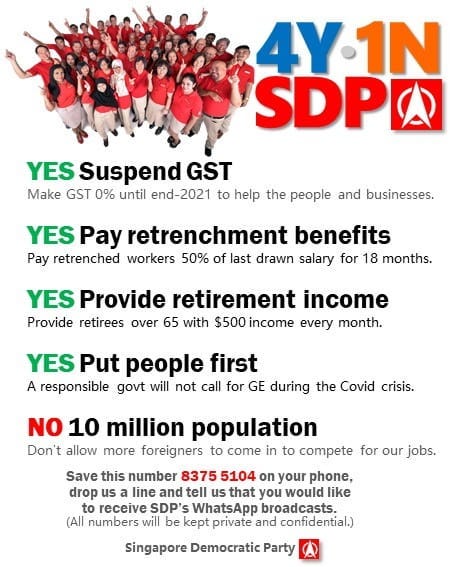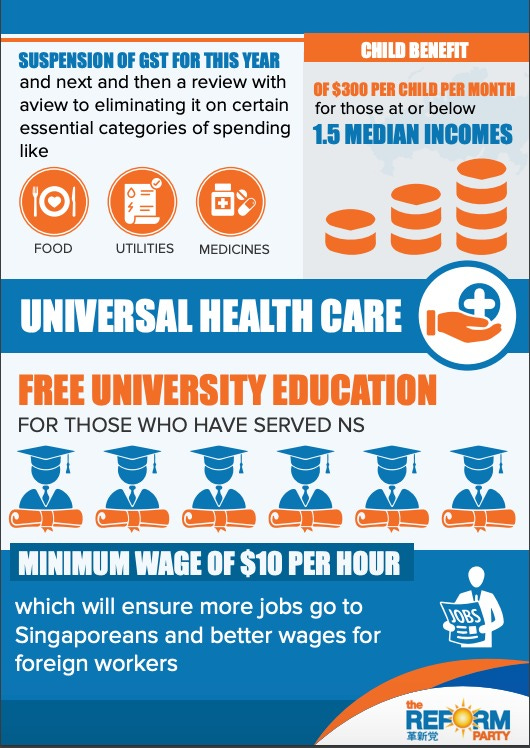Hello and welcome to another edition of GE20Watch!
Today is Nomination Day, and by the end of the day we’ll be able to finalise who is running where.
The parties have also been hard at work releasing their manifestos, laying out their plans should they be elected. In this issue, we’ll be giving you links to each of them and highlighting a few key points from each manifesto. Do take the time to read at least the summaries of each manifesto, as politics should be guided by substance as much as it is dominated by personalities.
Do give this newsletter a share and subscribe for regular updates over the next few days!
In the meantime, do check out “The Nine Days”, a daily newsletter-and-podcast covering the elections. For a quick, condensed history of Singapore elections until today, do also check out this primer.
Now, let’s delve into the manifestos. Here’s a consolidated Google Drive folder with all of them for easy viewing: https://tinyurl.com/GE20Manifestos
People’s Action Party: Our Lives, Our Jobs, Our Future

We start with the PAP’s manifesto, which can be found here in full. An interactive version can be found here, while they also have a video version. The manifesto focuses on three main areas:
Keeping Singaporeans and migrant workers safe during Covid-19
Restarting and transforming the economy, and
Providing care and support for one another.
The manifesto invokes how the PAP has weathered crises such as separation, 9/11, and SARS as early as page 4. It also outlines plans on investment in healthcare, job assistance schemes, support for SMEs, education and transport subsidies, support for seniors, and more sustainability measures such as planting one million trees and adding more nature parks. There is also a new $6 billion Assurance Package to help households pay for the GST increase, and long-term infrastructure plans such as Changi T5 and Tuas Megaport are mentioned, although the PAP notes that Covid-19 has slowed their development.
The PAP has never had very detailed manifestos, opting to focus more on their track record. This manifesto follows in that vein, and very much looks like ‘if it ain’t broke, don’t fix it’. The manifesto is also full of already existing schemes and plans implemented by the current government. Will this be enough to win over voters? And will the fact that we are still in the midst of a health crisis be enough to motivate people to stick with the status quo?
The Workers’ Party: Make Your Vote Count

WP’s manifesto can be found here in full, while summaries of key proposals can be found on their website.
Easily the most detailed manifesto amongst all the parties, WP makes 10 key proposals in 5 chapters:
Scrapping the GST hike
A national minimum wage of $1,300 for full-time workers, which can be pro-rated for part-time work
Lowering the CPF payout age from 65 to 60, and introducing a dividend from sovereign wealth fund GIC’s investment returns to be paid into CPF members’ Special Accounts
Introducing a Redundancy Insurance Scheme, where workers receive a payout equivalent to 40 per cent of their last drawn salary for up to six months and capped at $1,200 a month. Low-wage workers will get a minimum payout of $500 a month.
Expanding the use of Medisave for patients over 60 years old for all medical expenses at government health institutions
Lowering the cost of Intermediate and Long-Term Care through greater subsidies for patients with a monthly household per capita income below $3,200
Improving access to universities through targeted programmes and mentorships to help those from underprivileged backgrounds. Places for university admissions will also be increased with the aim of 50% of each cohort to obtain a university degree
Free public transport on trains and buses for Singaporeans aged over 65 and those with disabilities, funded from the Budget and Public Transport Fund
A universal buy-back scheme for all HDB flat lessees, and raising the Selective En bloc Redevelopment Scheme (SERS).
Ensuring the independence of national institutions by not allowing close relatives and current or former party colleagues of political office-holders to be appointed to key positions in national institutions such as sovereign wealth funds. The AGC should be separated into a prosecution service independent of the government and a government legal counsel, while the Elections Department and Electoral Boundary Review Commission should be removed from the purview of the Prime Minister’s Office. The GRC system and NCMP scheme should also be abolished.
Other notable policy proposals include offering free vaccinations for Covid-19, reducing class sizes in schools, addressing the gender wage gap, recognising unpaid labour, instituting anti-discrimination legislation for employment, allowing singles to buy 2-room BTO flats when they turn 28, and amending the Newspapers and Printing Presses Act to abolish the government’s power to require a class of management shares in newspaper companies (hence allowing media companies to be majority-owned).
WP’s policies have earned praise for their breadth and detail, although the scant focus on climate change is disappointing. Expect the PAP to question them on how they intend to finance all these proposals as well.
Progress Singapore Party: You Deserve Better

PSP’s manifesto, introducing their campaign slogan “You Deserve Better”, can be found in multiple languages at tinyurl.com/psp2020manifesto.
At a glance, their manifesto focuses on three main themes:
Economic Development: The party will adopt a Resurgence Strategy after the Covid-19 crisis to raise weal wages, invest in local SMEs and support their internalisation efforts, and review free trade agreements such as CECA, and introduce or lower quotas for EP, S Pass, and Work Permit holders, lowering the dependence on foreign labour and providing jobs for Singaporeans
Social Development: The party will improve financial assistance and create a stronger safety net, allow Singaporeans to withdraw up to $50,000 from their CPF at age 55, freeze tax and fee increases for the next 5 years and exempt basis necessities from GST.
Political Development: The party will provide an alternative voice in Parliament, expand Presidential oversight over key public appointments and ensure no conflict of interest, peg ministerial salaries to median income and reduce public spending, and encourage greater freedom speech and review POFMA.
These policies will be funded through cuts in public spending and investment returns from the sovereign wealth funds.
A noticeably lean manifesto, it also does not address the issue of climate change. It is easy to read, however, and with PSP’s main audience being older voters, it is accessible with clear ideas. Questions will be asked of the more specific details of some policies, however, as well as the financing of such policies.
Singapore Democratic Party: 4Y1N

The SDP had actually launched its campaign on April 28, with the tagline of ‘Four Yes, One No”. They stand for:
Yes to suspending GST by cutting the GST rate to 0 per cent until the end of 2021
Yes to paying retrenched workers a progressively smaller portion of their last drawn salary over 1.5 years (75% for the first six months, 50% for the next six months, and 25% for the last six months)
Yes to providing retirees over age 65 with $500 every month
Yes to being a check on the PAP
No to an increase in the population to 10 million by bringing in foreigners
SDP chairman Paul Tambyah and Alfred Tan expanded on several points of the campaign in a Reddit AMA, including reinstating estate duties and drawing from the investment returns on the reserves to finance their programmes. They also responded to feedback that their rhetoric is potentially xenophobic, and questions on climate change. Notably, they evaded questions on LGBT issues and whether Section 377A should be repealed.
Banking on a short list of policy promises to win them votes, the SDP’s largely social democratic ideological outlook is often mixed with borderline xenophobic sentiments against foreigners, presumably to shore up disenchanted voters. This has always been a weak point of the party, and they do not appear to be moving away from this stance anytime soon.
For a full and more detailed list of their policies, you can check out their website.
Singapore People’s Party: A Better Tomorrow

An executive summary of SPP’s manifesto can be found on their website, while the full manifesto can be found here. The manifesto is guided by the principles of Accountability, Commitment, and Empathy. Some of their main proposals include:
Reducing the voting age from 21 to 18
Allowing students from all tertiary institutions to use their parents’ CPF monies for school fees
Removing the GST hike
Introducing a minimum wage following a nationwide study on the amount needed for a basic standard of living
Combating the climate emergency by having Singapore companies divest from carbon-intensive operations and making environmental impact assessments mandatory
Enacting a Freedom of Information Act
Improving accessibility to mental health professionals and allowing employees to take unpaid mental health leave
Extending the lease buyback scheme for HDBs and abolishing the ethnic quota for homebuyers
Introducing environmental education and financial literacy into the school syllabus
Introducing an unemployment insurance and retrenchment rights and abolishing the retirement age
SPP’s manifesto has earned praise for its focus on climate change policies, which they formulated in collaboration with climate group Singapore Climate Rally. Their focus on mental health is also a welcome inclusion. Overall, their manifesto will appeal to youths, although questions will be asked of policies such as removing the ethnic quota for HDBs, a key policy that was implemented to prevent racial enclaves from forming.
Red Dot United: Explore New Directions Together

The weeks-old RDU have managed to release a surprisingly detailed manifesto, which can be found here. Their proposals can be divided into three main sections:
Improving Lives, Reducing Anxiety for Singaporeans: The party aims to review FTAs like CECA and how many local jobs have gone to Indian professionals, ensure a Singaporean First hiring policy and offer more protections to gig economy workers, allow singles to buy 3-room or smaller BTO flats and lower the minimum age to do so to age 30, not raise GST for the next five years, expand the scope of Medisave and provide subsidised doctor consultations without means testing, and peg ministerial salaries to the median gross monthly income, amongst other policies targeting healthcare and cost of living.
Providing More Options and Flexibility for Singaporeans: The party aims to review public spending and legislation such as the Presidential Elections Act, allow CPF members an option to withdraw all their monies at retirement age (55 years old) and borrow from their own CPF accounts, relook the school curriculum and lower class sizes, and review POFMA, ISA, and advocate for Freedom of Information.
Ensuring Singapore is Ready For the Future: The party aims to use the sovereign wealth funds to acquire companies in selected industries and reserve jobs in these companies for Singaporeans, increase paid parental leave from 16+2 weeks to 26 weeks, invest in cleaner energy such as solar energy, and push for a reduction of waste from households and businesses.
These are just a snapshot of the laundry list of policies RDU has presented. While there are some ideas which will be quite popular, some policies are borderline xenophobic (such as targeting Indian professionals), and some policies are more detailed than others. They also would require a large increase in government spending, and so their financing plans will be targeted. Furthermore, RDU will be running in Jurong GRC, a stronghold headed by Senior Minister Tharman Shanmugaratnam, who will press them hard on the economics. They will have it all to do.
The Reform Party: Build Back Better, Fairer


These two graphics essentially ARE the entire RP manifesto, but you can see their press release if you want to. There isn’t really much to summarise as it’s…all here, but one policy was met with some pushback, which is the promise of free university education for ‘those who have served NS’ and an additional tax on those who have not. This was immediately criticised as sexist in nature, as it is only compulsory for males to serve NS:


This led RP to clarify in later tweets:


Compare the number of retweets for both tweets though, ouch.
These policies will be funded by an additional $60 billion in government spending per year, out of the estimated $1.5 trillion in reserves that RP believes Singapore has.
The Other Parties
As of this time of writing, the other parties (NSP, People’s Voice, SDA) have not released their manifestos. Only Goh Meng Seng, the only candidate from the People’s Power Party, has put out a Facebook post saying that it was a ‘municipal manifesto’ for MacPherson SMC, where he is contesting. He aims to carry out the Home Improvement Programme (HIP), the Voluntary Early Redevelopment Scheme (VERS), and SERS for HDBs in the estate, build a Community Hospital, and set up a TCM Free Clinic and Soup Kitchen in the estate.
That’s it! I hope you’ve managed to learn a bit more about what each of the parties stand for, and hopefully this informs your thinking when you vote at the ballot box.



